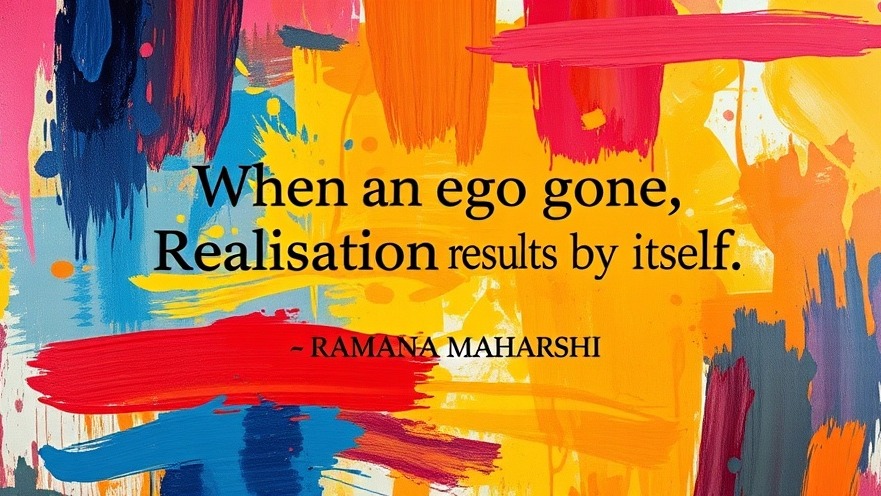
Understanding Ramana Maharshi's Influence
Ramana Maharshi is hailed as one of the most influential spiritual teachers of the 20th century, revered for his teachings on Self-Inquiry and the direct path to Self-realization. Far beyond being a name associated with meditation, his life and teachings offer a profound exploration of consciousness and the Self. As seekers around the globe aim to understand their existence, the core of Maharshi's message resonates: to look within and ask, 'Who am I?'
The Shift in Meditation Practices
In today's Western culture, the concept of meditation is frequently misrepresented. Many perceive it merely as a means to reduce stress, promote relaxation, or enhance focus. This interpretation is a far cry from Maharshi's teachings, which emphasize transcending the ego and achieving a deeper understanding of one’s true essence. This divergence prompts the vital question: have we forgotten the deeper purpose of meditation?
Ramana Maharshi: A Figure of Enlightenment
For those acquainted with his work, Ramana Maharshi remains a beacon in nonduality and Advaita Vedanta circles, inspiring countless seekers on their journeys towards enlightenment. His wisdom can be found in an array of books, online resources, and study groups, thriving in specialized communities across the West. His technique of Atma Vichara (Self-Inquiry) continues to inspire spiritual teachers who delve into the nature of awareness and consciousness. However, among the general public, many remain unaware of his profound impact.
Re-defining Meditation: A Western Perspective
In light of contemporary lifestyles, meditation has evolved in the West, transformed into a tool primarily associated with wellness and relaxation rather than Self-realization. Most practitioners of meditation today may not draw connections to the deeper layers of spiritual inquiry as taught by Maharshi. Instead of initiating a path of exploration into the Self, many engage with meditation simply as a technique for anxiety management.
The Disconnection Between Purpose and Practice
This twist in meditation’s role reflects an unsettling trend where the profound essence of mindfulness may become obscured amid the demands of modern life. The emphasis has shifted from understanding consciousness to merely cultivating a space for 'me-time.' As we observe this transition, we must ask ourselves: How does this altered approach to meditation impact our overall awareness of the Self?
Confronting Contemporary Misunderstandings
Many might assert that the modern, simplified view of meditation is adequate, yet without grappling with deeper self-inquiries, we risk losing a vital part of what meditation aims to achieve. There is a broader conversation to be had regarding these cultural shifts in consciousness practices. Meditation should serve to enlighten, to encourage individuals to look beyond fleeting thoughts and instead connect with profound, unchanging awareness.
A Call to Embrace Authentic Practice
Perhaps the challenge lies in reaching a balance between fulfilling contemporary needs and honoring the rich tradition of spiritual inquiry. Integrating trauma exercises and mindfulness practices that foster genuine connection to the Self could reclaim meditation’s purpose as taught by great sages like Ramana Maharshi. This can open a pathway back to awareness, authentic living, and flourishing well-being.
Actionable Insights for Modern Seekers
It is essential for those on a spiritual journey to actively seek out resources that inform and guide them towards deeper understanding—not just of the mind, but of the Self. Engaging in groups focused on the teachings of Ramana Maharshi could provide insights into aligning modern practices with traditional wisdom. Moreover, practitioners should explore techniques that delve into awareness rather than simply seeking relaxation.
By reclaiming a sense of purpose in meditation, seekers can cultivate a richer, more fulfilling spiritual practice—one that resonates deeply with the teachings of Mahashir. When we broaden our understanding and embrace accountable practices, we enhance our connection to ourselves and the universe.
 Add Row
Add Row  Add
Add 




Write A Comment